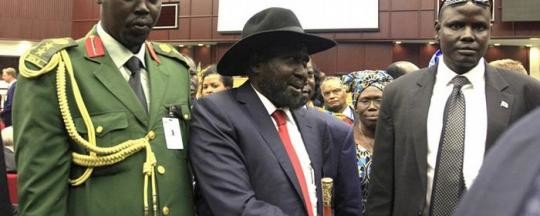Parliamentary leadership in South Sudan have dismissed the chairmen of five committees and the deputy chairpersons of two committees as punishment for having rejected a constitutional amendment related to the 28-states proposal, according to one of the ousted committee chairmen.
The 7 affected MPs have been removed from their positions as heads and deputy heads of committee, not from membership in the parliament itself.
The move highlights the split within the ruling party SPLM over Salva Kiir’s 28-states proposal, which would divide the country’s existing 10 states into smaller states.
On 19 November, a vote on a constitutional amendment giving Kiir new powers to create states and appoint state MPs and governors fell short of a required 2/3 majority, according to a tally of members by the parliament speaker at the time of the vote. Dozens of members primarily from the Equatorian caucus, Nuer caucus and Shilluk caucus either boycotted the vote or walked out, dealing a fatal blow to the amendment, according to MP Thomas Wani Kundu.
He told Radio Tamazuj yesterday that the parliamentary leadership yesterday removed the chairpersons of five committees from their positions, targeting “those who boycotted the sitting, stood against amendment of the constitution.”
The ousted chairmen include Thomas Wani himself, chairman of the information committee, Pasquale Clement Batali. chairman of the committee of land and agriculture, Julius Moi Linga, chairman of the committee of public service, Martin Mabil, chairman of the committee of physical infrastructure, and Gatwech Lam Puoch, chairman of the committee of energy and mines.
Deputy chairpersons removed are Bidali Moses, deputy chair for the committee of energy and mining, and Grace Anne, deputy chair for the committee of water resources and irrigation.
Thomas Wani protested the decision to remove them and challenged also the procedures for their removal, saying these had violated the parliamentary Conduct of Business. “There was no count and people clapped their hands, we were not even given a chance to speak,” he said.
The MP said it is normal for lawmakers to sometimes oppose a bill even by their own party, saying their boycott of the vote on the proposed constitutional amendment was also a normal parliamentary procedure and not grounds for removal.
“We have not made misconduct because boycott is a procedure in the parliament. In the parliament if you have contested with the issue in the debate you may say your reason and vote against it… or you may decide not to enter – you boycott,” he said.
File photo: SPLM Chairman Salva Kiir
Related coverage:
What steps are needed to create 28 states in South Sudan?
Map analysis: Ethnic balance to change if 28 states approved
Has South Sudan’s constitution been changed or not? (Arabic audio)




